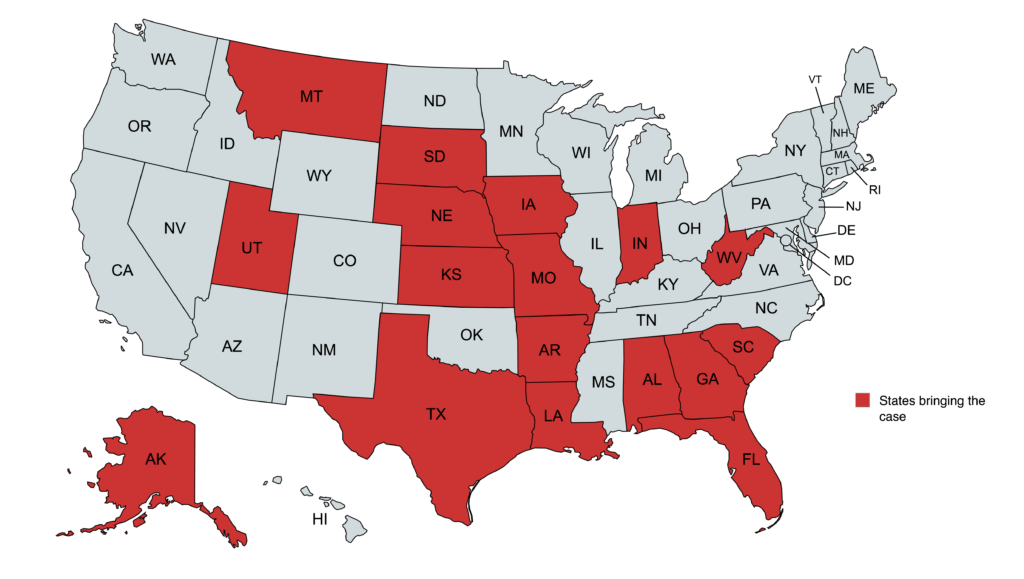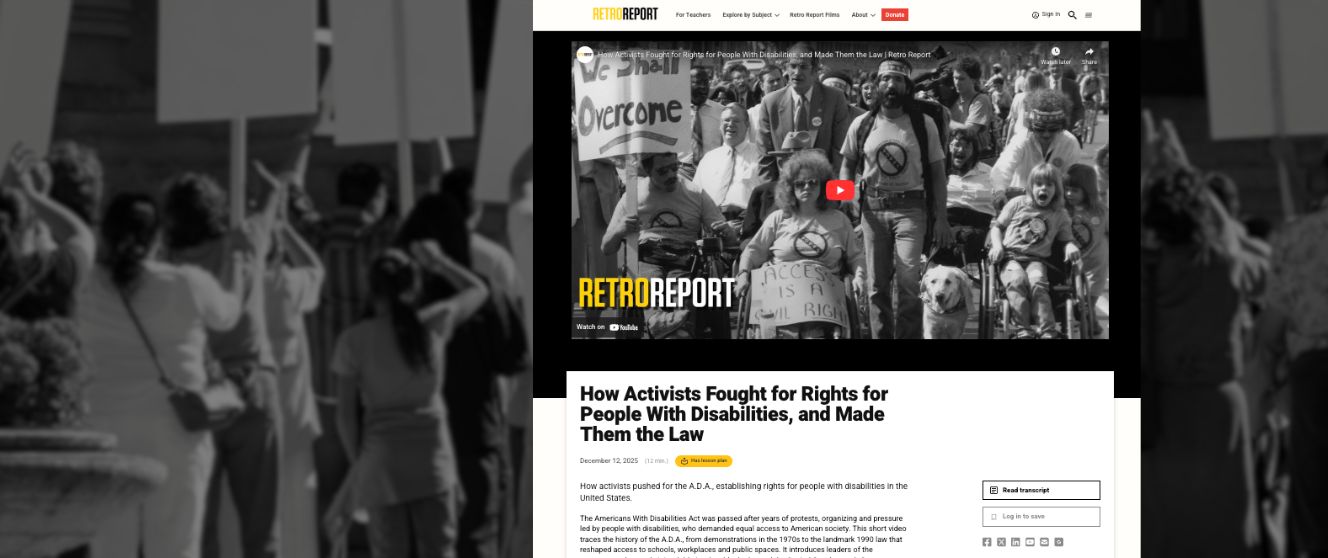
This page explains how Texas v. Kennedy (previously Texas v. Becerra) threatens Section 504, why Section 504 is important, and what you can do to help. You can learn What the lawsuit Texas v. Kennedy is and Why it Matters, What Section 504 is and why it matters, What the 17 States Want, What Will Happen Next, What You Can Do to Help, How to Contact Your State Attorney General. There is an Example Letter / Email, Call Script, and Additional Resources
What is Texas v. Kennedy? Why Does it Matter?
What is a lawsuit? What does it mean to sue?
A lawsuit is a kind of court case. The person who starts the lawsuit asks the court to fix a problem they are having. To sue someone means to start a lawsuit against them.
State governments and the United States government can sue each other. When governments sue each other, they are usually trying to get the court to change a law or government rule.
What is Texas v. Kennedy?
Texas v. Kennedy (previously Texas v. Becerra) is a court case in Texas that was filed in Texas in September 2024. A group of 17 states have sued the United States government. The 17 states are Texas, Alaska, Alabama, Arkansas, Florida, Georgia, Indiana, Iowa, Kansas, Louisiana, Missouri, Montana, Nebraska, South Carolina, South Dakota, Utah, and West Virginia.
The states are asking the court to get rid of Section 504 and its updated rules from 2024 that protect people with disabilities from discrimination in health care and human services.
What is Section 504?
Section 504 is an important law that protects people with disabilities. Section 504 says you can’t discriminate against disabled people if you get money from the United States government. To discriminate means to treat people badly because of who they are. Section 504 says you cannot treat people badly because of their disabilities.
Section 504 has rules that explain what disability discrimination is. The rules say that places like schools, hospitals, and doctors’ offices have to include people with disabilities. The rules say what these places have to do to include people with disabilities. Anyone who gets money from the United States government to serve the public or do business has to follow the rules.
The United States government finished the first Section 504 rules in 1977. Many disabled people protested so that the government would make the rules strong.
The United States government updates the Section 504 rules over time. The government just finished updating the rules in 2024. Many disability advocates wrote to the government about what to put in the rules. The updated rules are stronger and have more examples about what disability discrimination is.
Why is Section 504 important?
Section 504 covers all parts of society that get money from the United States government. Section 504 and its rules are very important, especially in education and healthcare. Here are some ways that Section 504 and its rules help us. The rules in Section 504 say that:
- Schools must include students with disabilities and help them learn.
- Doctors and schools must have sign language interpreters for people who are Deaf and Hard of Hearing who sign. Videos must have captions.
- Doctors must give clear information to disabled people. This includes people with intellectual and developmental disabilities.
- Websites for schools and hospitals must work for people who are blind and low vision.
- Doctors and hospitals cannot stop helping someone because they have a disability.
- Doctors and hospitals must have tools and machines that work for wheelchair users. This includes machines that check for cancer.
What are the latest updates on the lawsuit?
October 27 Status Report
On October 27, 2025, the parties filed another Joint Status Report. The parties asked the court to continue the “stay” or pause in the case. HHS said again that they “plan to release additional details regarding rulemaking plans related to Section 504 in the near future.” The parties said that the lawyers for HHS cannot work right now because of the government shutdown. The parties said they would file a new report on January 9, 2026.
July 29 Status Report
On July 29, 2025, the 17 states and HHS filed a Joint Status Report asking the court to continue the pause in the case. HHS said in the report that they “plan to release additional details regarding rulemaking plans related to Section 504 in the near future.”
April 11 Status Report
On April 11, 2025, the parties filed another Joint Status Report with the court. You can read more about the April update. This report makes a big change to the states’ claims about Section 504. It says:
Plaintiffs further clarify that they have no intention to seek any relief from this Court on Count 3 (Section 504 is Unconstitutional) of their Complaint [or] their Demand for Relief at d–e [declare Section 504 unconstitutional and block HHS from enforcing Section 504]. And nothing in Plaintiffs’ Complaint seeks to … prevent the Federal Government from allocating spending or applying the provisions of the Rehabilitation Act to any recipients of such funds.
This means the 17 states have abandoned their constitutional challenge to Section 504. This means that the district court in Texas will not rule on whether or not Section 504 is constitutional. The question of whether Section 504 is constitutional will not go to the Fifth Circuit Court of Appeals or the U.S. Supreme Court. While this is good news, the states have not dropped the case and the Department of Health and Human Services (HHS) have joined in the attack on the rights of transgender people.
The states are still challenging the updated Section 504 rules from 2024. The updated rules include important information and guidance about disability discrimination, particularly for healthcare and education. We will watch the case carefully and report on what happens. We will also watch carefully whether the new Administration tries to change or rescind the updated Section 504 rules.
April 10 HHS Clarification
A new document from HHS also changes the Texas v. Kennedy case. On April 10, 2025, HHS published a “clarification” in the Federal Register. The clarification states that the language about gender dysphoria in the preamble to the updated Section 504 regulations “does not have the force or effect of law” and “cannot be enforced.” For background, HHS had previously reviewed a court case that found that gender dysphoria can be a disability under federal law. At the time, HHS wrote that gender dysphoria could be a disability. But now HHS leadership is saying that people with gender dysphoria are not protected by Section 504. The part of the original complaint brought by the 17 states in September 2024 that complained about HHS including gender dysphoria in the preamble of the updated 504 regulations is now “moot”.
We are upset that the Administration is trying to take rights away from transgender people. The disability community includes transgender and gender-nonconforming people. Section 504 protects people with any disability. The HHS document does not change existing case law that protects transgender people with disabilities. We will continue to advocate for the rights of transgender people, with and without disabilities.
February 19 Status Report
On February 19, 2025, the parties filed a status report. The report makes clear that all 17 states continued to argue that Section 504 is unconstitutional. You can read this explainer from disability advocacy organizations about the February status report.
There are a lot of unknown questions:
- The states are still challenging the updated Section 504 rules. Will the 17 states continue to litigate this challenge?
- If the 17 states continue, will the new administration defend the Section 504 rules?
- If the new administration will not fully defend the case, will other parties intervene to defend the lawsuit?
What is the deadline for amicus briefs to support Section 504 and its regulations?
Right now, there is no briefing schedule. This means that, right now, there is no deadline for amicus briefs. If and when there is a briefing schedule, we will make sure that the views of the disability community are represented before the court.
What Can I Do to Help?
Tell Your State Attorney General to Stop Attacking Section 504
You can do more if you live in one of the states that is bringing the case. You can ask your state Attorney General to drop out of the case. You can thank your AG for dropping the constitutional challenge. You can ask them to drop out of the case in a meeting, in writing, or on the phone. You can ask by yourself or in a group. A group of people can be powerful. You may find a group in your community. You can ask disability groups like your local Center for Independent Living or a chapter of the Arc.
How to Contact Your State Attorney General
If you live in one of the states that is part of the lawsuit, you can contact your state Attorney General and tell them to drop out of the case. If you live in a state that is not part of the lawsuit, you can still contact your Attorney General and tell them to do what they can to protect Section 504 and the new rules. The red states in the image are the states bringing the case:

The contact information for each state Attorney General involved in the case is available on this page. Or use this list with the contact information for all 50 state Attorney Generals.
If you choose to write a letter to your state Attorney General, you can follow this format:
- Say who you are. Say your name or the name of your group. Say where you live. If you want, you can say what your disability is.
- Say why you support Section 504 and its rules. Talk about why Section 504 is important to you. Section 504 and its rules make sure people with disabilities can be included in schools. Section 504 and its rules make sure people with disabilities can see their doctor.
- Include personal details. You can tell a personal story about why Section 504 matters to you. Some stories that might be helpful to include are:
- How a 504 Plan helped you be included in school as a child or young adult. How a 504 Plan allows your child to participate in school.
- How a reasonable accommodation helped you gain or maintain employment.
- How your needs are met in a community integrated setting.
- How you got an interpreter at a doctor’s appointment and were able to talk to your doctor.
- Say why Texas v. Kennedy is bad. If the court agrees with the states bringing the lawsuit, people with disabilities will lose civil rights. These rights have protected people with disabilities for over 50 years.
- Tell your state Attorney General to drop out of the case [or that you support Section 504]. If you live in a state that is part of the lawsuit, tell your Attorney General to stop attacking Section 504 and its updated rules and pull out of the lawsuit. If you live in a state that is not part of the lawsuit, tell your Attorney General that you support Section 504 and all its regulations.
- If you want, ask for a meeting. Say that you and your group would like to set up a meeting to talk about why Texas v. Kennedy hurts people with disabilities.
Alaska
Attorney General Treg Taylor
- Email: attorney.general@alaska.gov
- Address: 1031 West 4th Avenue, Suite 200, Anchorage, AK 99501
- Phone: 907-269-5100
- Alaska’s Website Contact Page
Alabama
Attorney General Steve Marshall
- Alabama’s Email Submission Form (Scroll down to “If your concerns fall outside of the above circumstances, then you must complete in detail and submit the form below.”)
- Address: 501 Washington Ave., Montgomery, AL 36104
- Phone: (334) 242-7300
- Alabama’s Website Contact Page
Arkansas
Attorney General Tim Griffin
- Email: oag@arkansasag.gov
- Address: 323 Center Street, Suite 200, Little Rock, AR 72201
- Phone: (501) 682-2007 or (800) 482-8982
- Arkansas’ Website Contact Page
Florida
Interim Attorney General John Guard
- Email: john.guard@myfloridalegal.com
- Address: Office of the Attorney General, State of Florida, PL-01 The Capitol, Tallahassee, FL 32399-105
- Phone: (866) 966-7226 or (850) 414-3300
- Florida’s Website Contact Page
Georgia
Attorney General Chris Carr
- Email: none listed, directs people to call
- Address: 40 Capitol Square, SW, Atlanta, GA 30334
- Phone: (404) 458-3600
- Georgia’s Website Contact Page
Indiana
Attorney General Todd Rokita
- Email submission form
- Address: Indiana Government Center South, 302 W. Washington St., 5th Floor, Indianapolis, IN 46204
- Phone: (317) 232-6201
- Indiana’s Website Contact Page
Iowa
Attorney General Brenna Bird
- Email: comment@ag.iowa.gov or webteam@ag.iowa.gov
- Address: Office of the Attorney General of Iowa, Hoover State Office Building, 1305 E. Walnut Street, Des Moines, IA 50319
- Phone: (515) 281-5164
- Iowa’s Website Contact Page
Kansas
Attorney General Kris Kobach
- Email submission form
- Address: 120 SW 10th Ave. 2nd Floor, Topeka, KS 66612
- Phone: (785) 296-2215
- Kansas’ Website Contact Page
Louisiana
Attorney General Liz Murrill
- Email: constituentservices@ag.louisiana.gov
- Address: 1885 North Third Street, Baton Rouge, LA 70802
- Phone: (225) 326-6079 or (877) 297-0995
- Louisiana’s Website Contact Page
Missouri
Attorney General Andrew Bailey
- Email submission form (scroll down to “Questions”)
- Address: Missouri Attorney General’s Office, Supreme Court Building, 207 W. High St., P.O. Box 899, Jefferson City, MO 65102
- Phone: (573) 751-3321 (dial 711 to connect to a relay service for hearing/speech disabilities)
- Missouri’s Website Contact Page
Montana
Attorney General Austen Knudsen
- Email: contactdoj@mt.gov
- Address: P.O. Box 201401, Helena, MT 59620-1401
- Phone: (406) 444-2026
- Montana’s Website Contact Page
Nebraska
Attorney General Mike Hilgers
- Email: ago.info.help@nebraska.gov
- Address: Nebraska Attorney General’s Office, 2115 State Capitol, P.O. Box 98920, Lincoln, NE 68509
- Phone: (402) 471-2683
- Nebraska’s Website Contact Page
South Carolina
Attorney General Alan Wilson
- Email submission form (Scroll down to “Submit Question or Comment”)
- Address: The Honorable Alan Wilson, P.O. Box 11549, Columbia, SC 29201
- Phone: (803) 734-3970
- South Carolina’s Website Contact Page
South Dakota
Attorney General Marty Jackley
- Email submission form (Scroll down to “Contact us by E-mail”)
- Address: Office of the Attorney General, 1302 E Hwy 14 Ste. 1, Pierre, SD 57501-8501
- Phone: (605) 773-3215
- South Dakota’s Website Contact Page
Texas
Attorney General Ken Paxton
- Email submission form
- Address: Office of the Attorney General, P.O. Box 12548, Austin, TX 78711-2548
- Phone: (512) 463-2100
- Texas’ Website Contact Page
Utah
Attorney General Derek Brown
- Email: uag@agutah.gov
- Address: Office of the Attorney General, Utah State Capitol Complex, 350 North State Street Suite 230, Salt Lake City, UT 84114-2320
- Phone: (801) 366-0260
- Utah’s Website Contact Page
West Virginia
Attorney General John B. McCuskey
- Email: None listed
- Address: State Capitol Complex, Bldg. 1, Rm E-26, 1900 Kanawha Blvd. E, Charleston, WV 25305
- Phone: 304-558-2021
- West Virginia’s Website Contact Page
Example Letter / Email
Here is an example of an email to a state Attorney General asking them to drop out of the case:
To: attorney.general@alaska.gov
Subject: Stop Attacking Section 504! Drop Out of Texas v. Kennedy!
Dear Attorney General [Treg Taylor],
[Say who you are] I live in Juneau, Alaska, and I have a disability. I am hard of hearing and use a wheelchair. I volunteer for the Southeast Alaska Independent Living Center. I go to college part time.
[Say why you support Section 504 and its rules] I care about Section 504. I can go more places in my wheelchair because of Section 504. I can go to the doctor and use a scale for people who use wheelchairs. I can get captions for my college classes. I support the updated Section 504 rules. The updated rules are stronger and give more examples of what disability discrimination is.
[Say why Texas v. Kennedy is bad] I am very upset and angry that you have joined a case in Texas called Texas v. Kennedy that goes against Section 504 and the updated rules. You are asking the court to get rid of the Section 504 rules and the entire law. If the court does what you ask, I will not be able to go to the doctor or my college classes and get equal treatment. I will not have equal rights. This will be true for all the other disabled people in Alaska.
[Say you want them to drop out of the case] I want you to drop out of Texas v. Kennedy. You should support Section 504 and its rules. You should not be attacking our rights.
[Ask for a meeting] I want you to meet with me and other people with disabilities. We want to talk to you about the case and why we are so concerned about it.
Sincerely,
[Your name]
Call Script (For Attorney Generals Signed On to the Case)
My name is [your name], and I live in [your city, your state].
I am a person with a disability. [Say more about your disability].
I am very upset that you have joined Texas v. Kennedy, a lawsuit asking a Texas court to declare Section 504 and its updated HHS regulations unlawful and unconstitutional. This request is located on page 42 of the complaint.
Section 504 and these updated regulations are extremely important to the disability community. Section 504 and its rules make sure people with disabilities can be included in schools and can see their doctor. [Say why you care about Section 504 – for example, share about a 504 plan you had in school or a time that you were able to get an ASL interpreter at a doctor’s appointment .]
If the court agrees with the states bringing the lawsuit, people with disabilities will lose civil rights. These rights have protected people with disabilities for over 50 years. This is NOT OK!
If you care about the disability community and do not want to tear down Section 504, drop out of the lawsuit NOW!
Thank you,
[Your name]
Additional Resources
Resources About Texas v. Kennedy
- April 21, 2025: Update on the Texas v. Kennedy (previously Texas v. Becerra) Lawsuit
- Texas v. Kennedy (previously Texas v. Becerra): Frequently Asked Questions (FAQ)
- Contact list of 50 State Attorneys General
- February 21, 2025: Update on the Texas v. Kennedy (previously Texas v. Becerra) Lawsuit
- February 12, 2025: Webinar Recording: Disability Community Briefing: What You Can Do to Stop the Attack on Section 504
- January 31, 2025: Plain Language Explainer: Texas v. Kennedy (previously Texas v. Becerra) Section 504 Under Attack
Resources About the Section 504 & the New Section 504 Rules
- New Section 504 rules | Administration on Community Living
- New Section 504 and 1557 Regulations | American Association for People with Disabilities
- Documentary: Crip Camp: A Disability Revolution
- Video: The Power of 504

Our ability to maintain and provide these resources is made possible by the Puffin Foundation.


